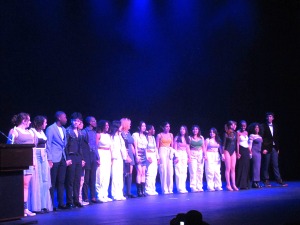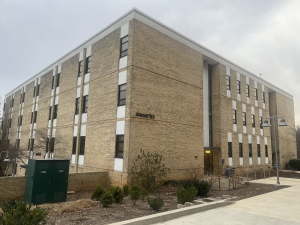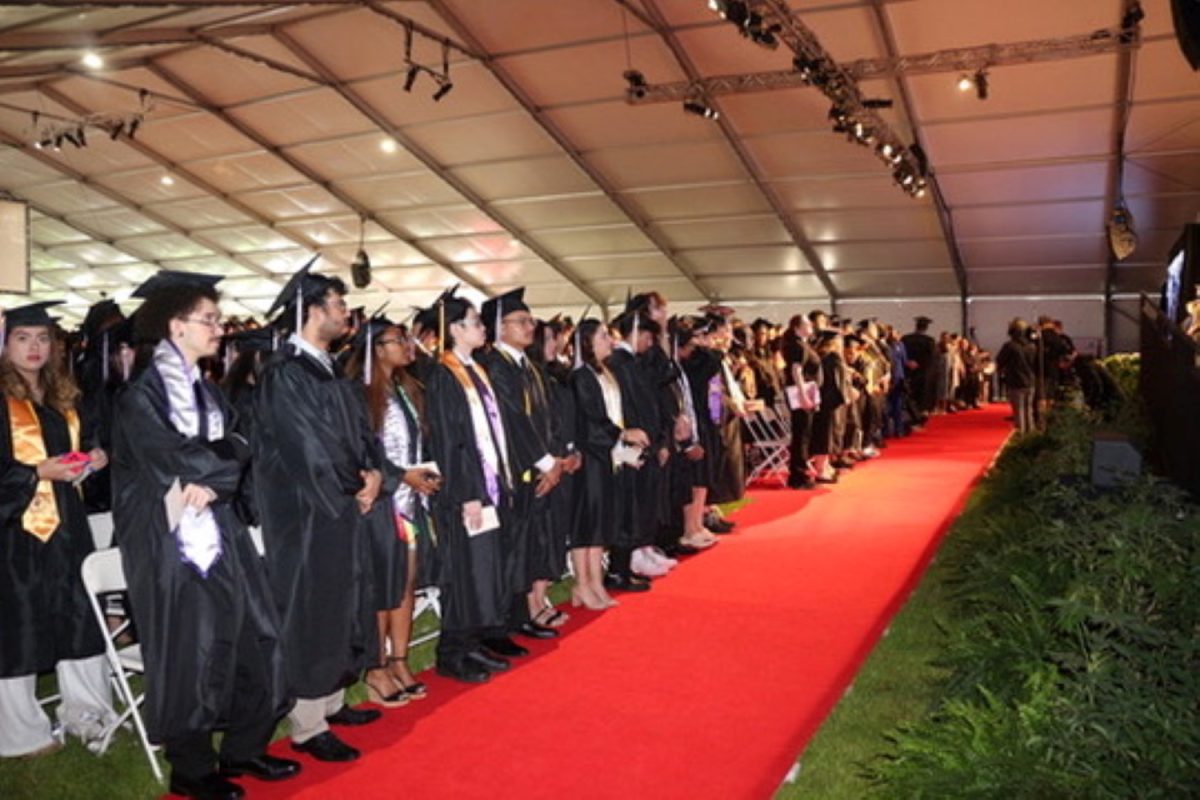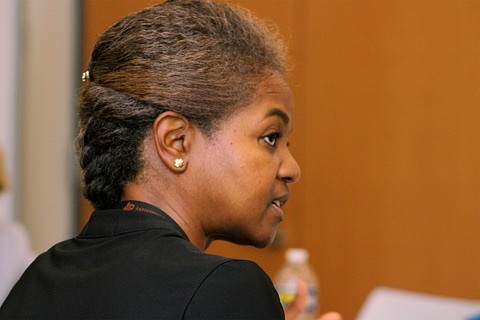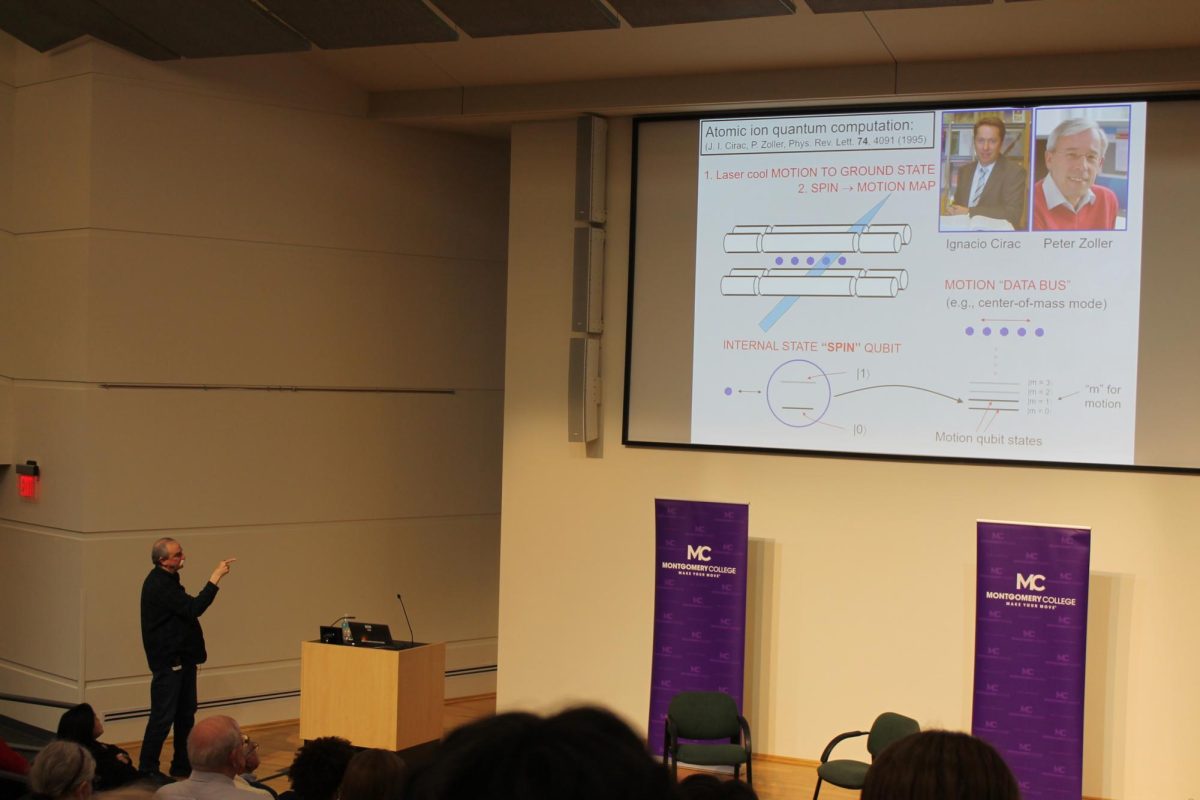The Rockville campus hosted a panel of speakers for International Peace Week on Tuesday, Sept. 25 at the Theatre Arts Arena. A number of speakers gathered to discuss what international peace meant in our day and age before an audience of students and faculty.
The United Nations officially recognizes September 21 as the International Day of Peace. And according to the United Nations website, the International Day of Peace is “a day devoted to strengthening the ideals of peace, both within and among all nations and peoples.”
A number of speakers at Rockville addressed students and faculty with regards to promulgating pacifism throughout the college. While most people would agree that we live in turbulent times, where nations often struggle amongst one through violence, the professors voiced the notion that everyone, as an individual, can contribute to the prospect of peace in the world.
The Aikido Way
Laura White, of the college’s Human Resources department began the discussion. She started off with an anecdote about Aikido, a form of Japanese martial arts where a fighter does not actually attack his opponent but rather uses the enemy’s strength against them. White argued that pacifists should be like Aikido combatants, and should circumnavigate hostility rather than answering violence with violence. She remarked that a fighter in Aikido needs to be firmly planted on the ground and within themselves, and that an individual who supports the ideals of peace should be strongly rooted in their identity as a person. White hosts courses in cultural competency for MC staff members, and is familiar with the process of mediation in resolving disputes.
The South African Model
Tulin Levitas, professor of Philosophy and Women’s Studies, spoke next. Levitas recounted how the events of 9/11 caused her to despair at the crime committed against humanity that day, but that the subsequent invasions of Afghanistan and Iraq horrified her even more.
She related how in 2004, she went on a trip to South Africa for research purposes. While in South Africa, she visited an archaeological site known as the “Cradle of Humanity” and went to the Apartheid Museum in Johannesburg. Levitas expressed that for her, South Africa expressed an extreme discrepancy in the fact that the ancestors of all humans are thought to have migrated out of the region thousands of years ago, but that up until very recently, the country espoused a policy that mandated racial separation.
According to Levitas, in the years following Nelson Mandela’s election, the South African Truth and Reconciliation Committee aimed to move past the obstacles of Apartheid with forgiveness rather than retribution. This enabled the country’s smooth transition to democracy.
“[The people of South Africa] could have hosted their own version of the Nuremberg Trials,” said professor Levitas. “But instead, they chose to respond to oppression through cooperation and healing.”
Philosophy student John Daniel followed Levitas at the podium, and continued with Professor Levitas’ comments about South Africa. He explained how faculty members had planned a course at the college called “Forgiveness and Reconciliation Based on the South African Model.” Daniel argued that South Africa’s methods of extending forgiveness towards their oppressors was ultimately a more proactive course of action than returning aggression with further injury. He brought up the African Ubuntu philosophy, which at its center contains the maxim, “I am because we are.” He remarked that if one of us were injured, collectively we as humans are all injured. Daniel claimed that genocide and injustice should be resolved through peaceful means.
Professor Pat Ruppert, professor of Women’s Studies, addressed the audience afterwards. She spoke about how in one of her classes, students watched a film called “Long Day’s Journey Into Night.” The film recounted the story of Thappelo Mbelo, a black South African who was forced to work for the Dutch Secret Police during the Apartheid regime. At one point, Mbelo and his squad were ordered to kill a group of seven young black protesters.
Professor Ruppert played an excerpt of the film for the audience, during which Mbelo meets the mothers of the seven young men that he killed, as ordained by the Truth and Reconciliation Committee. Mbelo looked into the faces of the mothers of those young men he killed, and said apologetically, “Forgive me, my parents.” He expressed his sincere guilt over what he had done, and explained how he was forced to carry out the executions. One of the mothers told how her son was on the ground, begging for his life, and Mbelo still shot him.
With tears in his eyes, Mbelo expressed his remorse and pleaded for the mothers’ forgiveness. Another one of the mothers remarked that regardless of what happened afterwards, her son was never coming back to life, and that in the end, it would only do her more harm to bear a grudge against Mbelo. She noted that his first name, “Thappelo,” means “prayer.”
“I do not know if you live by what your first name means,” she said. “But one day, you will have to answer to God. It will do me no good to hate you for the rest of my life, because my son is gone forever anyway. I forgive you.” By the end of the scene, a number of audience members had shed tears. Professor Ruppert explained how the mothers gradually forgave Mbelo, and embraced him at the end.
Pacifism
Nathan Zook, professor of political science at Montgomery College, was the next speaker. He began by talking about the assassination of Archbishop Óscar Romero during the 1980s civil war in El Salvador. Zook explained that the conflict was being waged between the oppressive military government of El Salvador and a group of leftist rebels known as the FMLN (Frente Farabundo Martí para la Liberación Nacional, or Farabundo Martí National Liberation Front). Frequent human rights atrocities were committed by both factions, and Romero, a pacifist, vehemently condemned the violence.
Both sides believed that Romero was against them, and on March 24, 1980 he was assassinated after performing the Eucharist ritual during a mass. Zook urged the audience to look to Romero’s exemplary pacifism as a means to combat violence. He expressed admiration at the archbishop’s uncompromising stand against the human rights violations being committed around him, and noted that at the end of a conflict, it is always best for the victims to forgive and forget rather than carry on resentment with them, or worse: attempt to exact vengeance. Professor Zook has recently received a grant to establish a Model UN chapter at MC.
Teaching peace
Layla Hashemi, MC’s political science chairperson, then addressed the audience. Hashemi spoke about developing a course called “Human Rights in a Global Context.” The course, she stated, would focus primarily on teaching methods to promote peace.
Bill Soderberg, a professor of world languages and philosophy, was the last speaker of the panel. He stressed the importance of teaching students how to be pacifists in a world that all too often resorts to violence. Soderberg delineated a number of peace-centered courses currently being offered at MC, and expressed his interest in establishing a Peace and Justice program of study here.
He listed a number of accredited colleges and universities that offer students a certificate in the aforementioned program, and remarked that MC would ultimately shape its students into finer citizens by offering this program. Soderberg is working towards being able to give MC students a certificate in Peace and Justice Studies.
The aftermath
At a quarter past noon., the symposium was over. Students quickly scattered off to their next class, and the remaining audience members gradually disbanded. Amidst the flux of people, professor Ruppert agreed to answer a few questions for me. I asked what the role of forgiveness was in relation to attaining peace.
“In the words of Desmond Tutu, ‘There can be no peace without forgiveness,'” she said. “We must dig deep within ourselves and find forgiveness in order to attain the goal of peace.”
She added that it takes much more strength for someone who feels that they have been wronged to forgive their aggressor rather than bear a grudge against them.
I asked what was the most important thing that students could do to promote peace. After a bit of contemplation, she replied, “The single most important thing that students can do to promote peace is to study the existing models for peace. There have been examples set by people like Gandhi, or Martin Luther King Jr., and if we want to promote peace, we should study these examples.”
In a little over an hour and 15 minutes, the speakers at MC’s International Peace Week panel had left their audience with plenty to think about. Their words reverberated in the minds of those individuals who want to promote peace in the world.
One of the central points that all the speakers touched upon is the individual’s contribution to peace. Although at times we may ask ourselves, “What difference does it make what I do?” we should follow through with our intentions, and the outcomes may yet surprise us. It can be argued all day whether humans are by nature good or evil.
People like Jean-Jacques Rousseau would argue that wars and violence are a result of the influence of society, while thinkers like Thomas Hobbes would claim that society exists to protect individuals from one another. There may not necessarily be any concrete answers as to these questions on the ethics of humans. But one thing is certain — if humans are capable of violence, they are also capable of nonviolence. If some individuals out there can wage war, others can struggle for peace. Whether the world knows tranquility or turmoil is determined by us humans as “citizens of the world,” as Greek philosopher Diogenes famously proclaimed. If we want the 21st century to be one of peace, it is our responsibility to work towards that peace.



